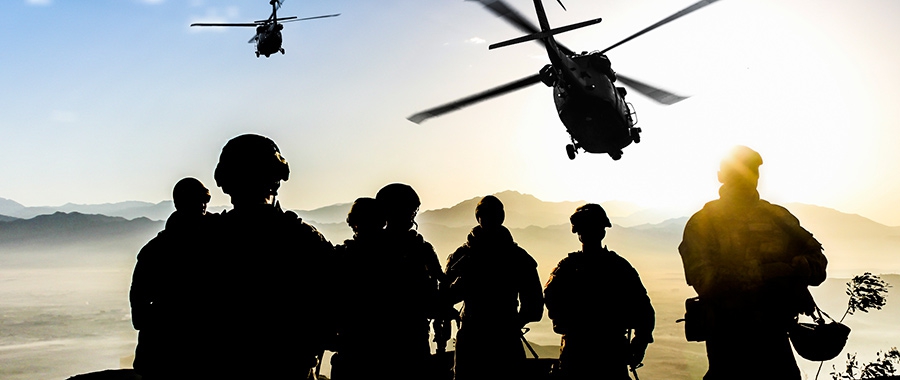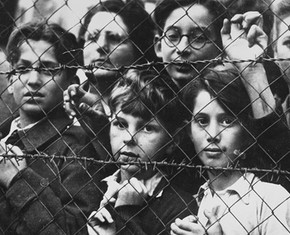The views expressed in our content reflect individual perspectives and do not represent the authoritative views of the Baha'i Faith.
Weapons, I learned in the Army, are not only fearsome, ugly and brutal—they’re incredibly expensive.
It requires an enormous amount of money to destroy lives, villages, cities and civilizations. But since the average person never goes shopping for weapons of war, we don’t have a very good sense of how much they actually cost. Which is too bad—because we pay for them. Our taxes buy those weapons.
The Baha’i teachings speak out against such never-ending expenditures. Abdu’l-Baha wrote about:
… the well-known case of the [European] ruler who is fostering peace and tranquillity and at the same time devoting more energy than the warmongers to the accumulation of weapons and the building up of a larger army, on the grounds that peace and harmony can only be brought about by force. Peace is the pretext, and night and day they are all straining every nerve to pile up more weapons of war, and to pay for this their wretched people must sacrifice most of whatever they are able to earn by their sweat and toil. How many thousands have given up their work in useful industries and are laboring day and night to produce new and deadlier weapons which would spill out the blood of the race more copiously than before.
Each day they invent a new bomb or explosive and then the governments must abandon their obsolete arms and begin producing the new, since the old weapons cannot hold their own against the new. For example at this writing, in the year 1875, they have invented a new rifle in Germany and a bronze cannon in Austria, which have greater firepower than the Martini-Henry rifle and the Krupp cannon, are more rapid in their effects and more efficient in annihilating humankind. The staggering cost of it all must be borne by the hapless masses.
Be just: can this nominal civilization, unsupported by a genuine civilization of character, bring about the peace and well-being of the people or win the good pleasure of God? Does it not, rather, connote the destruction of man’s estate and pull down the pillars of happiness and peace? – Abdu’l-Baha, The Secret of Divine Civilization, pp. 61-62.
In a geopolitical situation like the one we have today—unbridled and potentially chaotic national sovereignty, with nations armed to the teeth with weapons of mass destruction and no reliably effective international peacekeeping mechanism—those high expenditures on weapons of war have predictably continued to rise over time.
So what do we pay for our “security?”
One of the best, most respected and most frequently cited compiler of world military expenditures—The Stockholm International Peace Research Institute (www.sipri.org)–reports that the world’s nations spent $1.69 trillion on their militaries in 2016. Of course, hardly anyone can even begin to conceptualize a figure that huge. Instead, just to get a different perspective on our weaponized world, let’s look at per-capita spending, which gives a vastly different and more understandable view.
The extensive SIPRI database says that their $1.69 trillion figure (generally seen as very conservative because it does not include things like veteran’s benefits and demobilization expenses) corresponds to approximately $250 in U.S. dollars for each person in the world each year. Because three-fifths of the world’s population lives on less than $2 U.S. per day, that figure represents a huge burden on those whose incomes fall in the low- to middle-income ranges.
To get a sense of what that means, consider the entire cost of the United Nations and its global peacekeeping, food security and refugee efforts: $30 billion per year. That amounts to $4 per person in the world per year, less than 3% of the world’s current military spending. The United Nations, most would agree, is not perfect—but it could certainly strengthen its global peacekeeping efforts, and its capacity for effective international negotiations, if it had more resources.
Just by comparing those two per capita figures, you can see how much the world could potentially save by reducing its militaries and arms, and centralizing its security and defense needs. The United Nations has reported that the world’s nations could provide basic education for every child for $6 billion; clean water and sanitation for the planet for $9 billion; reproductive health for all the world’s women for $12 billion; and basic health and nutrition for everyone for $13 billion. When you add them up, these four human necessities represent $40 billion, only a tiny fraction of our combined military budgets.
Baha’u’llah foresaw this global problem of military spending a hundred and fifty years ago, and asked the leaders of the world to solve it before the injustices it engendered created an armed conflagration civilization could not withstand. In today’s climate of terrorism, regional conflicts and massive military spending, we have seen those prophecies go generally unheeded by the world’s leaders, who have continued to increase their military budgets to record levels. Now, Baha’is believe, we must act to disarm and demilitarize, before it’s too late.
The disturbing fact that the world spends so much on its militaries, weapons and armaments—and so little on its ultimate goals of global security, international cooperation and peace—reveals a great deal about our priorities. Until we find ways to reverse those priorities, the Baha’i teachings say, we will continue to live in a world plagued by disunity, death, destruction and war.
















Comments
Sign in or create an account
Continue with Googleor